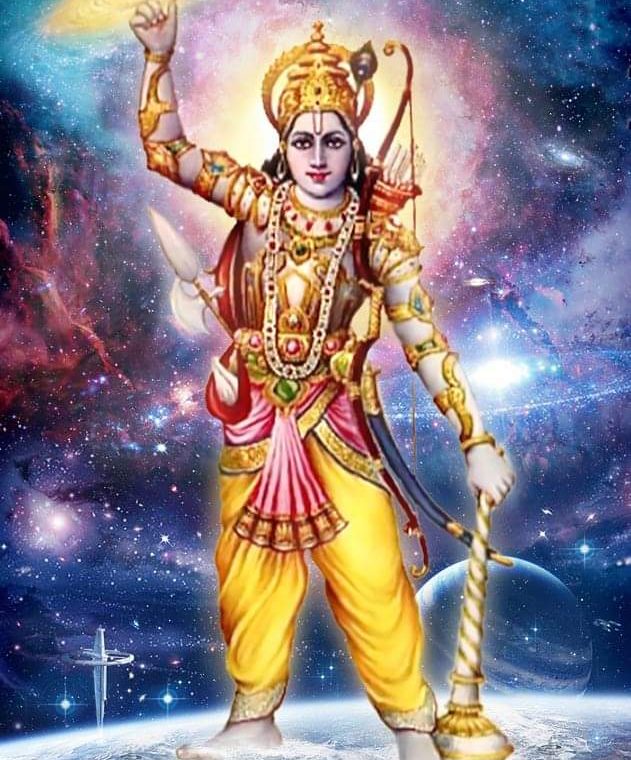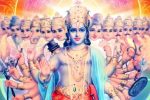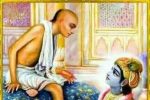NAME 81
Durādharṣaḥ दुराधर्षः
Durādharṣa means invincible. There is a subtle conveyance in this nāma.
This nāma says that He cannot be conquered. This nāma does not speak about His valour. This is particularly so because of the previous nāma. Conquering here means, the conquering His heart. He heart cannot be conquered by those who are not devout to Him. True devotion alone can conquer His heart and for others He remains invincible. When devotion turns into love, the devotee moves very close to Him.
Kṛṣṇa Himself explains this in Bhagavad Gita (II.59), “Sense objects turn away from him, who does not enjoy them with his senses; but the taste for them persists. This relish also disappears in the case of a man with stable mind, when he sees the Supreme.”
Duradharsah – He is Invincible
Adharsha means being overcome or being vanquished. So Duraadharshah essentially means that the Lord is Invincible. ‘daityaa dhibhih dharsha yitum na sakyata iti duradharshah’ – One who cannot be overcome by the demons and others.
He can only be overcome by total surrender and Bhakti. This aspect is explained in the next Nama
One who cannot be attacked, stormed or beleaguered successfully. In short, He is All-Powerful.
“Daityadhibhih Dharshayitum Na Sakyata Iti Duradharshah ”
One who cannot be overcome by the demons and others. In the Puranas, we find Daityas and Asuras and others, mighty and powerful ones, become themselves helpless victims of His Power and come under His sway. To one who has realized the Infinite, the lower nature of the mind (Daityas) and the enchantments of the senses (Rakshasas) , are all helpless to overwhelm Him. “Rasopyasya Param Drishtva Nivartate” – (Gita).
Bhagavad Gita (II.59)
विषया विनिवर्तन्ते निराहारस्य देहिन: |
रसवर्जं रसोऽप्यस्य परं दृष्ट्वा निवर्तते || 59||
viṣhayā vinivartante nirāhārasya dehinaḥ
rasa-varjaṁ raso ’pyasya paraṁ dṛiṣhṭvā nivartate
BG 2.59: Aspirants may restrain the senses from their objects of enjoyment, but the taste for the sense objects remains. However, even this taste ceases for those who realizes the Supreme.
Commentary
When one gives up eating, as in a fast, the desires of the senses become feeble. Similarly, in sickness one loses interest toward the objects of enjoyment. These states of dispassion are temporary, for the seed of desire remains within the mind. Again when the fast is terminated or the sickness goes away, the desires return.
What is this seed of desire? It is the intrinsic nature of the soul for the divine bliss of God, of whom it is a tiny fragment. Until it gets that divine bliss, the soul can never be contented, and the search for happiness will continue. Sādhaks (spiritual aspirants) may forcibly restrain their senses with their will power, but such restrain is temporary because it does not extinguish the internal flame of desire. However, when the soul engages in devotion toward God, and gets divine bliss, it experiences the higher taste for which it had been craving since infinite lifetimes. The Taittirīya Upaniṣhad states:
raso vai saḥ rasaṁ hyevāyaṁ labdhvā ’nandī bhavati (2.7.2)[v50]
“God is all-bliss. When the soul attains God, it becomes satiated in bliss.” Then, one naturally develops dispassion toward the lower sensual pleasures. This detachment that comes through devotion is firm and unshakeable.
Thus, the Bhagavad Gita does not teach a dry suppression of desires, instead it teaches the beautiful path of sublimation of desires by directing them toward God. The Saint Ramakrishna Paramahamsa expressed this principle very eloquently, when he said: “Devotion is love for the highest; and the lowest shall fall away by itself.”
८१. ॐ दुरादर्षाय नमः |
81. OM Durādarṣāya Namaḥ
Duraadharshah -One who cannot be attacked, stormed or beleaguered successfully. In short, He is All-Powerful. In the Puranas, we find Daityas and Asuras and others, mighty and powerful ones, become themselves helpless victims of His Power and come under His sway. To one who has realized the Infinite, the lower nature of the mind (Daityas) and the enchantments of the senses (Raakshasas) , are all helpless to overwhelm Him. “Rasopyasya Param Drishtvaa Nivartate” -Geeta Ch. 2, St. 59.
duraadharshhaH Who cannot be confronted (nor His orders Scriptures)
Daityādibhiḥ duḥkhenāpi ā (īṣadapi) darṣayituṃ na śakyate iti / दैत्यादिभिः दुःखेनापि आ (ईषदपि) दर्षयितुं न शक्यते इति He who cannot be assailed by asuras (demons) and such.
INTERPRETATION GUIDED BY SANT VANI (WORDS OF SAINTS)
Durādharṣaḥ
The unassailable.
The one who is unassailable, who cannot be defeated by the asuras or rāksasas. This is the traditional meaning.
He who cannot be assailed, attacked or defeated by the Asuras or anyone for that matter. He who cannot be overcome by anyone. That powerful being who can never be defeated. (Śaṅkara & Parāsara Battar)
Having said that the Lord is almighty, why is it said that He cannot be over-powered? You
cannot say He is almighty and then say that no one can defeat Him!
Īśvara is very much with us. Much the same sentiment is expressed by the boxer when he says to Īśvara, “You better be on my side in the boxing ring.” But, His grace cannot be tapped without śraddhā and bhakti.
Specifically, prayer attracts a result called punya, what helps to rearrange and reorganize the hidden variables that unfold every single day. This punya may neutralize some of the Prarabdh and Sanchit karma standing in a person’s account, whereby the intensity of the unpleasant situation is reduced or one develops greater strength to deal with difficult situations or the fog of doubt clears and one sees the situation more clearly. The punya may also exceed the causal karma that is unfolding on that particular day, such that one finds oneself hearing a lot of good news and has much progress in one’s pursuits. The only way one knows about the consequences of our good and evil actions is through the Vedas and that requires śhraddhā.
He cannot be won over by those who have asura like tendencies. The grace of Īśvara is like water which is very much available in the sub-soil, but still not available to the thirsty person. One has to tap that water by a special efforts of digging to reach the source of water. Similarly the anugraha, grace of the Lord has to be tapped with śhraddhā and bhakti. Lest it become a business transaction, (I‘ll pray and you answer my prayers), bhakti changes the person because of the unique developing relationship with Īśvara.
The angst and frustration with people around us, situations around us and even what we wanted to be and how we have turned out is an expression of resisting facts. When one sees the order pervading all of these, in terms of the psychological, genetic and karmic laws of cause and effect, then there is greater clarity in how things are and what needs to be done.
If you have śhraddhā and devotion you can tie Īśvara down; otherwise, He is invincible. A gopi tells Śrī Kṛṣṇa, ‘hastad nikṣipya yāto’ si balāt Kṛṣṇa kim abdhutam–what is the wonder if you wriggled out of my hold by sheer physical strength? Hrdayām yadi niryāsi gaṇayāmi te pauruṣam–I can reckon with your physical strength, if you can get out of my heart.’
Here tying down Īśvara is not trying to control or dominate but an expression of bhakti, in many ways, saying, ‘My bhakti for you runs do deep that even you can’t change it.’ It is not Isvara‘s responsibility to prove that he is worthy of bhakti. If I discover bhakti, it is good for me as I stop resisting facts in life and discover an abiding acceptance of what is.
This is that name of that Supreme Being that comes up in a string that talks of Contentment, Order, Discernment, Courage, the bow-wielding Sri Rāma, and the soaring Garuḍa and nothing could be more apt – At one level, the need to destroy all that is useless – disorder, confusion & delusion, fear etc. is crucial to make the necessary progress in the inward journey. At the same time, this name is also a clarion call to what our true legacy is:
That every time the needle of Dharma tilts, the balance shifts, then he will come to push the needle back and right the balance and he will do that not through words and pious pleading but through Saṃhāra (संहार), annihilation of the wicked and slaughter of the Asuras.
PLEASE WATCH
Take the avatāras of Viṣhnu itself:
Read what Varāha did to Hiranyaksha, when he kidnapped Bhūma-Devi and hid her under the waters – Varāha decimated the hordes of Rakshasas and pummeled Hiranyaksha to death with his bare hands – so angry was he that when he let out that primeval scream before diving into the waters, it sent a shiver down the spine of the Devās as well. Nārasiṃha and his Saṃhāra of Hiranyaksha’s brother, Hiranyakashipu; Paraśurāma who killed the entire dynasty of Kārtavīrya and all the kṣatriyas on earth twenty-one times in order to lessen the burden of the world and rectify the balance once again.
The destruction of the Rakshasas at Janāsthana, Dandakāranya, and the Saṃhāra of the clan of Rāvana at the hands of the greatest wielder of the bow, Sri Rāma and then the killing field of Kurukṣetra carefully orchestrated by that Kṣetrajña who chose to remain a Pārthasārathi (charioteer of Pārtha/Arjuna) but still oversaw the great massacre that pushed the needle back and balanced the scales of Dharma.
And what to say of Caṇḍikā (चण्डिका) or the Raudra-rūpas of our other devās and deities.
It is in this context that the misplaced and misunderstood concept of Ahimsa that has somehow come to be seen and often projected as a central tenet of Hindu Dharma seems so baffling. Pātañjali may have included Ahimsa as one of the Yamas (disciplines) in spiritual practices but that is an injunction to the sadist who takes pleasure in inflicting pain on innocents and for those without a moral compass or for the Sanyasi. It cannot be a broad brush to paint the entire Dharma with and straitjacket an entire community into following it or be defined by it. We are the legatees of a Dharma that asks us to go forth as lions and not be meek as lambs.
PLEASE WATCH
Someone as gentle as the Kanchi Paramacharya himself is on record saying that the blanket application of Ahimsa is wrong, impractical and morally improper.



